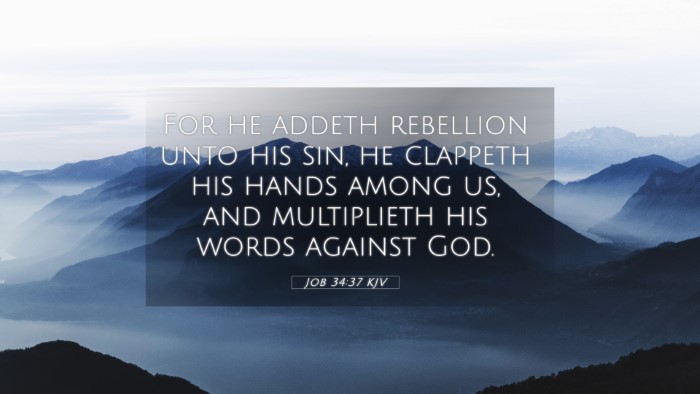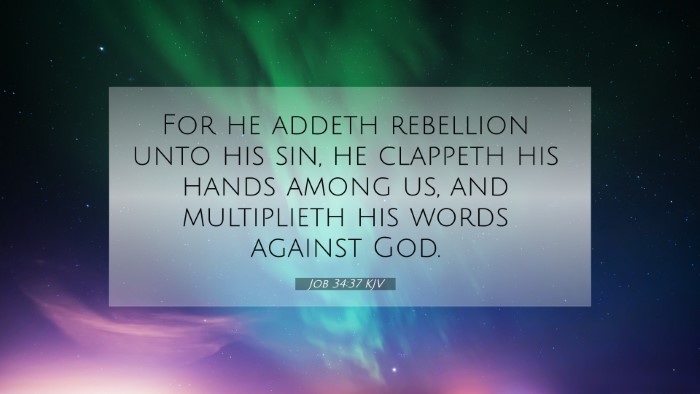Understanding Job 34:37
Job 34:37 presents a profound insight into the nature of humanity and God's judgment. To gain a deeper understanding of this verse, we can draw from various public domain commentaries.
Verse Breakdown
In this verse, Job, amidst his trials and dialogues about God's justice, brings forth themes of human responsibility and the consequences of sin. The verse captures the essence of human folly and the serious nature of divine judgment.
Commentary Insights
-
Matthew Henry:
Henry emphasizes the folly of pride and arrogance that leads to a rejection of God's authority. He highlights that such attitudes provoke God’s displeasure and ultimately lead to one’s downfall.
-
Albert Barnes:
Barnes discusses the idea that human beings often bring upon themselves the consequences of their actions. He notes that when one turns against God, it leads to justified divine retribution.
-
Adam Clarke:
Clarke points out the critical importance of recognizing God’s justice and mercy. In his analysis, he encourages readers to reflect on their behaviors and the implications of their choices before the Almighty.
Thematic Connections
This verse connects deeply with themes of human accountability, the nature of sin, and God's judgment. It underscores the relationship between human actions and divine consequences.
Relevant Cross References
- Job 1:22 - Emphasizes Job's integrity amid suffering.
- Proverbs 16:5 - Highlights the Lord’s disdain for the proud.
- Romans 2:6 - Connects to the principle of divine judgment according to deeds.
- Galatians 6:7 - Stresses the concept of reaping what one sows.
- Psalm 73:18-19 - Reflects on the fate of the wicked versus the righteous.
- Isaiah 40:23 - Discusses God’s sovereignty over rulers.
- James 4:6 - Reinforces that God opposes the proud but gives grace to the humble.
Connections between Biblical Texts
Job 34:37 serves as a pivotal point of intersection for various biblical themes, encouraging believers to explore:
- The link between Job's assertions of innocence and the broader biblical theme of suffering.
- The juxtaposition of human arrogance seen in both Job's friends and contrasting characters in the Bible.
- The justice of God conveyed through narratives in both the Old and New Testaments.
Practical Application
Understanding Job 34:37 calls for introspection regarding our actions and attitudes toward God. It is crucial to recognize:
- The danger of pride and self-sufficiency.
- The importance of humility before God’s authority.
- How our choices can lead to consequences not only for ourselves but also for those around us.
Conclusion
In conclusion, Job 34:37 serves as a stark reminder of the accountability each person has before God. As explored through various commentators, the verse illustrates the consequences of ignoring divine authority and the absolute nature of God’s judgment.
This analysis encourages readers to engage with tools for Bible cross-referencing and to consider relevant scriptures that support or deepen the understanding of this important verse.
By inspecting the links between this verse and others, believers can better grasp the comprehensive narrative of accountability and divine justice woven throughout scripture.
Further Study Suggestions
For those interested in deeper study, it is recommended to:
- Utilize a Bible concordance to find related verses.
- Engage in comparative Bible verse analysis to uncover thematic connections.
- Participate in cross-reference Bible study sessions to explore insights collectively.











